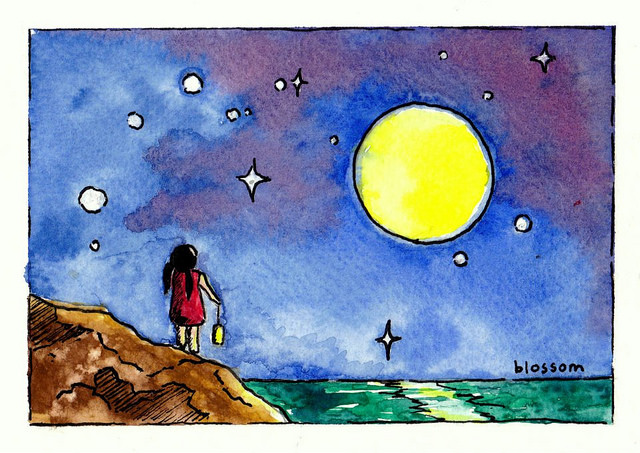Graphics by Blossom Wen
Life is not a bed of roses, and we all know that too well. In the face of life’s troubles, people have different ways of coping. Some justify their pain with the money earned, some are driven solely by passion, while many others find solace in religious traditions. Common questions posed to humanists are: What do we believe in and how do we stay strong in the presence of adversity? How do we keep going despite the absence of supernatural beliefs?
As a community which does not operate on dogma, the Humanist Society (Singapore) has no fixed answers. Instead, we started a small discussion on the Singapore Humanism Forum, with a goal to collect some responses from humanists and let the community know about how others manage difficulties in life. This is the question we posed:
In over a week, we gathered thirty over responses. They vary from long inputs from the opinionated to short (but not necessarily trivial) and simple responses. For easier reading, we classified them into 4 categories:
- Dealing with the root of the problem
- Comforting your heart and mind
- Looking at the big picture
- Appreciating the small things in life
Here are some highlights from Chinmaya Joshi, Denise Liu, Hafiiz A. Rahman, Batara Siagian, Kok Ming, LiTin Barffie, Blossom Wen, Joy Xiang, Yeo Khirn Hup, Ivan Ng, Mark Kwan, Nicholas Tan, Lee Hao Ran and Alywn Ng.
Dealing with the root of the problem
Chinmaya started by cautioning that sufferers of clinical depression should seek professional help. He also advises a pragmatic approach by seeking out the root of the problem at hand.
“As a non-believer who builds my worldview on science and reason rather than dogma, the approach is to understand and deal with the problem,” he wrote. “If one is feeling low, there is usually a reason. Often spelling it out and acknowledging it is part of the solution. Another aspect is actually working to solve the issue.”
Another respondent, Hafiiz A. Rahman, suggested spending time to record and evaluate your problems.
“Take a day or two to re-evaluate the direction of my life,” he wrote. “I realized that I feel overwhelmed when I have large, pending issues I need to take action on. Journaling also helps because it helps you get a different perspective on your troubles.”
Comforting your heart and mind
Dealing with problem also requires psychological strength. No man’s an island, and unhappiness can be soothed by family, friends and even fellow creatures on this planet.
Denise said that she will “think about all the things I am grateful for in life- friends, family and the people who love and care for me; good music to listen to and books to read, knowledge to acquire.” This view is shared by Joy, who wrote that she is comforted by “having people who love you in your life, such as your family members and close friends.”
For Batara, he will take his dogs out for a long walk. “This always make me feel better because it reminds me they offer me unswerving loyalty and affection,” he explained. “They ask for very little in return, no matter what the world does to me.” LiTin Barffie said that she will “play with my cats, have a nice meal, sing a sad song and tearing along with it, hug my husband and go to sleep.”
Chinmaya added that “Sharing one’s feelings diminishes the severity (of the sadness).”
“Cheering up measures like music, food, friends, chocolate, comedy usually contribute to a cure,” he wrote. “Something that seems to be undervalued these days is to actually cry it out.”
Looking at the big picture
Other responses point to looking at the bigger picture, and that problems are often temporary.
“It helps to know that what’s bothering me for the moment almost certainly won’t matter in a few months,” said Blossom. “What’s life without ups and downs? Our time is short. Be happy while it lasts.”
Kok Ming shared that he will remind himself to accept that misfortune and pain can happen in life. “Then, I will just enjoy the present moment, and finally proceed to work on important projects” he said.
Denise said that she would take things in perspective and think about the people less fortunate than her, and think about how she can, even in a small tiny way, attempt to help others through volunteering her time, energy or money.
Nicolas said that he will tell himself that when the situation hits rock bottom it can only become better. “As long there is life, there is hope,” he said. “There are also plenty of examples where ordinary people are able to get out of bad situations by simply not giving up.”
Hao Ran took an interesting biological perspective, reminding himself that emotions are are chemical reactions and action potentials that obfuscate a rational perspective of things. He also added that reminding himself that there is no justice in the world gets him “to take a step back to see the big picture, just do what is best given the circumstances.”
Khirn Hup also sees life as a lucky gift because he “ did nothing to deserve it.”
“The whole cosmos lacks meaning anyway; so I may as well enjoy the ride whilst I can,” he said. “And if I really can’t, I would love to have the option to call it quits on my own terms. I look forward to the day when the right to die is seen as nothing extraordinary.”
Appreciating the small things in life
Ivan and Denise shared that they takes comfort in the small things in life:
Ivan said: “For me, life keeps life going. It’s the little things in life, the things that happen everyday, the stuff that we sometimes think of as mundane. I enjoy the occasional dinner mom whips up when she has the time. I enjoy the computer games I play daily yet doesn’t seem to get bored of. I enjoy following or participating in the conversations on FB (with you people a lot of the time). I enjoy the brief infrequent gestures of goodwill, be it a baby smiling at me or me helping someone pick up something they dropped.”
For Denise, she takes pleasure in the simple things in life- enjoying a good cup of coffee, petting my dogs, taking a warm shower.
Others preferred to share the quotes that inspired them. Mark posted this quote from Rudyard Kipling, a Nobel Prize winning English short-story writer, poet, and novelist:
“If you can dream – and not make dreams your master;
If you can think – and not make thoughts your aim;
If you can meet with Triumph and Disaster
And treat those two impostors just the same;”
– ‘If…’ by Rudyard Kipling
Alywn ended off by quoting from the book Silent Spring, written by Rachel Carson in 1962:
“Those who contemplate the beauty of the earth find reserves of strength that will endure as long as life lasts. There is something infinitely healing in the repeated refrains of nature — the assurance that dawn comes after night, and spring after winter.”
-Silent Spring, by Rachel Carson






